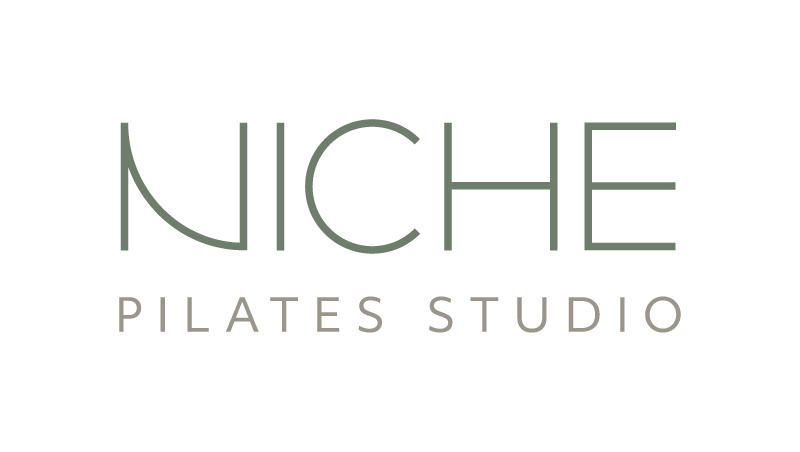Grounded Connection: Pilates and Mental Health
“I’m doing this for my mental health.”
“A little treat for my mental health.”
“Mindfulness.”
“Menty B.”
But what do we actually mean when we talk about mental health?
Unless you're a psychiatrist or neuroscientist, mental health can feel like a vague, catch-all term. At Niche, when we talk about mental health, we’re referring to your physiological wellbeing — the state of your mind as it relates to how you live, move, connect, and cope. Good mental health can be characterized by many things: your ability to cope with the normal stress of life, to feel connected to others, to feel rooted in your inherent self-worth. There’s no one-size-fits-all definition of good mental health, so instead, let’s focus on how Pilates supports it. We know that regular exercise plays a major role in mental wellbeing, but what is it about Pilates specifically that helps you navigate life with more clarity, resilience, and ease?
Step 1: making the time for you
The first step is simply making time for yourself. Yes, when you come to Niche, you're strengthening and stretching your muscles, elevating your heart rate, and building bone density. But perhaps more importantly, you're carving out 50 uninterrupted minutes just for you. It's 50 minutes to unplug from distractions, stressors, and digital noise. It's 50 minutes to be surrounded by others who showed up with the same intention—to take care of themselves.
Step 2: Settle In
Pilates is a practice of presence. Through breath work, controlled movement, and focused attention, it draws you out of your head and back into your body: achieving the “mind-body connection” that we are continuously talking about around the studio.
This mind-body connection does more than just keep you grounded—it plays a vital role in supporting your nervous system. The deliberate pacing and breath-centered movement which is a cornerstone of Pilates helps to activate the parasympathetic nervous system, your body's “rest and digest” mode. This activation counterbalances the stress-induced “fight or flight” response governed by the sympathetic nervous system. As a result, practicing Pilates can lead to a reduction in cortisol levels, lowered heart rate, and improved digestion. The rhythmic, mindful breathing encourages a physiological state of calm, allowing the body to shift out of chronic stress and into a space where healing and recovery can occur. Over time, this consistent activation of the parasympathetic response can enhance emotional regulation, improve sleep quality, and build resilience against daily stressors, making Pilates not only a physical practice but a powerful tool for nervous system health.
Even when the class is physically challenging, the structure is soothing. You’re being walked through your work out with grace and compassion, but being subtly pushed to challenge yourself or try something new. In so many ways, you are not only strengthening your body, but your mind. When your mind is focused on lifting the opposite arm of the leg that is moving, and connecting your breath with that movement, you simply don’t have the capacity to be thinking about your never ending to-do list.
Step 3: Realize your potential
Progress in Pilates isn’t always loud or flashy, but it’s powerful. The small wins (a deeper core connection, a more stable plank, a smoother flow) add up over time.
That steady sense of growth builds not only physical strength but internal confidence. You feel capable. And that sense of capability carries into the rest of your life. Our instructors are focused on providing encouraging cues, cultivating an uplifting atmosphere in class, even during the most challenging sequences. We are genuinely excited to watch you grow and achieve your goals!
Realizing your potential isn’t just about achieving external success; it’s deeply connected to your mental and emotional well-being. When you begin to recognize your capabilities and take steps toward your goals, it cultivates a sense of purpose, self-worth, and inner confidence. This forward momentum can help reduce feelings of stagnation, anxiety, or low self-esteem, replacing them with motivation and hope. Engaging in meaningful growth activates positive neural pathways in the brain, reinforcing a healthier mindset. Whether it’s learning a new skill, overcoming a challenge, or simply honoring your strengths, the process of reaching for your potential reminds you that you are capable, resilient, and worthy—all essential foundations for strong mental health.
At Niche, we take our commitment to your mental health to heart. Below are some ways that our instructors cultivate positive mental health in their own lives. Check out our 30 minute gentle Pilates flow with guided meditation that you can watch on our own on Mental Health day, or return to any day that you need a gentle and restorative workout.
“I try to plan no-tech days and find activities that involve active presence in the moment, especially with my husband and friends” - Hannah
“I keep a gratitude journal where I make sure to write down at least one thing that I am grateful for each day. It keeps my mindset positive even when my life might feel chaotic.” - Katie
“I like to watch the sunset while listening to music or sit on the bridge that connects Belle Isle to Brown’s island. It’s like seeing the world in a panoramic view reminds me that the world is much more vast than the thoughts in my head, and I find that soothing.” - Jemma

